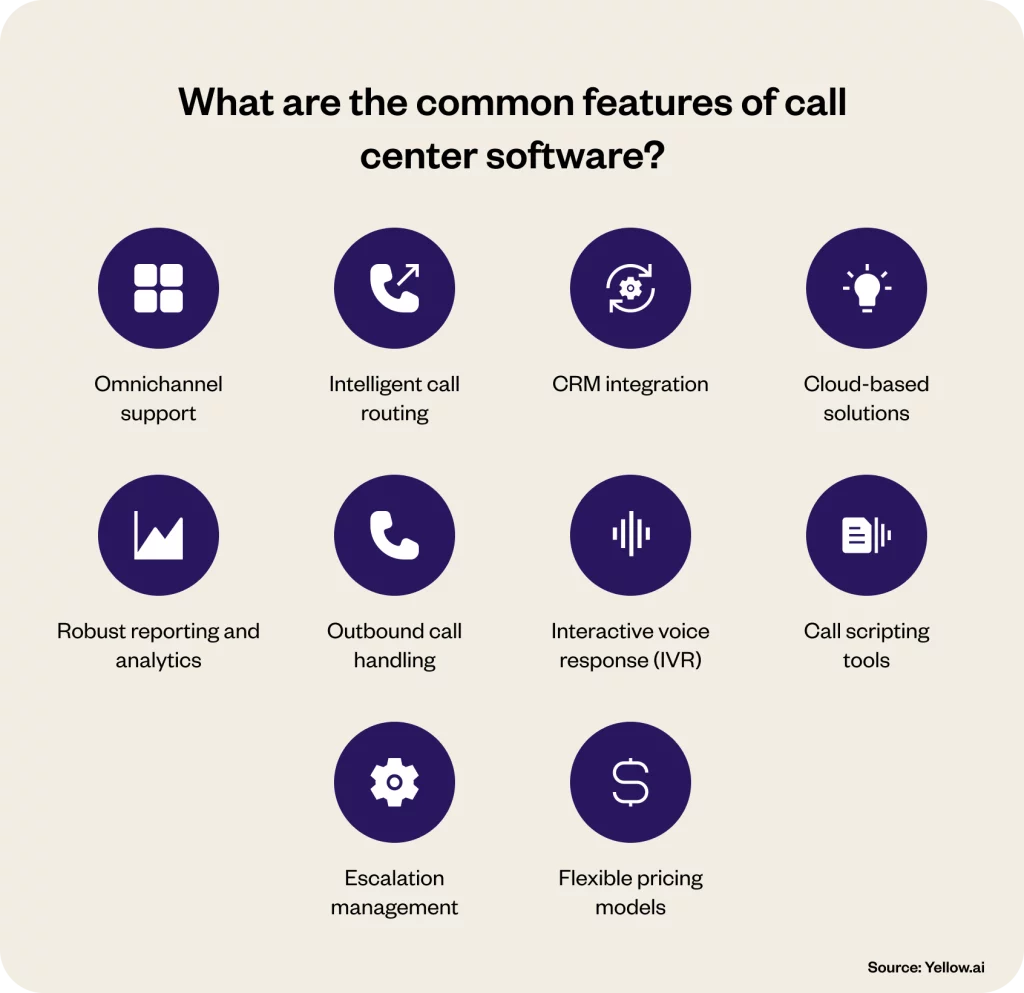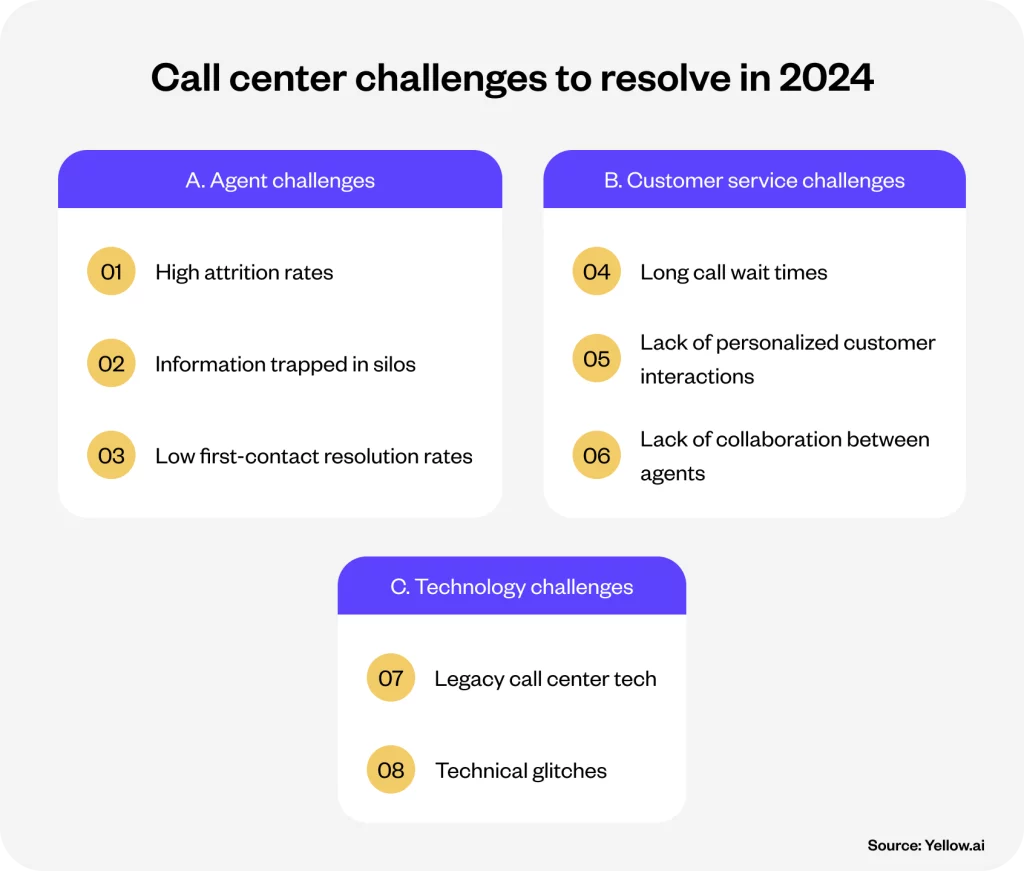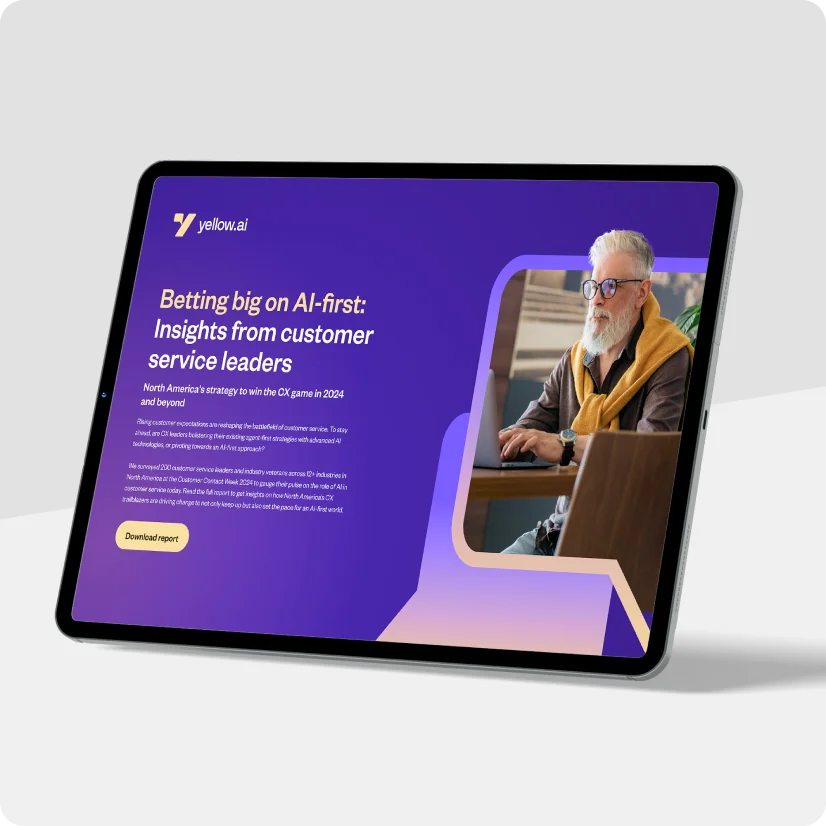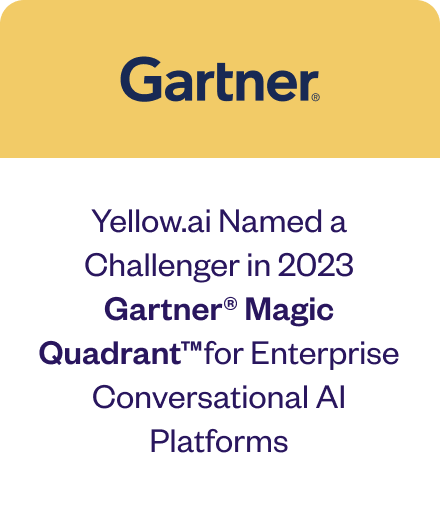Executive summary
Navigating the diverse landscape of call center software can be challenging for businesses seeking to elevate their customer service in 2024. This blog provides a comprehensive overview, covering the significance, benefits, and detailed guide to the top 12 call center software solutions. We explore various platforms – from virtual to inbound call center software to scheduling and workforce management tools. This blog explains how these solutions enhance customer engagement and streamline operational efficiencies, empowering businesses to meet the evolving demands of modern customer service.
The hum of a busy call center is more than just a backdrop; it’s a symphony of opportunities to strengthen customer relationships and drive business success. Today, when digital channels are in the limelight, the personal touch of a phone call remains a cornerstone of customer interaction. A State of the Connected Customer Report 2023 by Salesforce identifies that 88% of consumers like to engage with companies over the phone. This preference underscores the lasting importance of call centers in our increasingly digital world.
Today’s call center software industry is transforming the traditional call center into a hub of efficiency and personalized service. Far from the outdated image of frustrating waits and scripted responses, modern solutions offer a seamless mix of technology and human connection. These systems are vital partners in managing customer interactions, equipped with features like omnichannel support, insightful analytics, and targeted agent training. Through these advanced solutions, businesses are redefining the call center experience. Moreover, they ensure each conversation is an opportunity to impress and engage. Read on to explore the top call center software of 2024 and how every call is a chance to excel in customer service.
What is call center software?
Call center software is a vital tool for modern businesses, as it plays a crucial role in managing customer interactions. This technology is more than just a system to connect calls; it’s a comprehensive solution that streamlines the entire customer service process. Imagine a system so adept that it flawlessly routes calls, swiftly collects caller details, and smartly triggers answers to frequently asked questions. Besides managing calls, it is about creating an ecosystem where efficiency and customer satisfaction coexist harmoniously.
Businesses dealing with high volumes of calls, both inbound and outbound, find call center software an ally to uplift the quality of their phone support while cutting down operational costs. By automating critical call-handling processes, these solutions minimize human errors and significantly alleviate the pressures often felt in call centers.
Many call center solutions now offer omnichannel support, a critical feature in today’s interconnected world. It means businesses can manage various communication forms, like emails, chats, and social media interactions, from a unified platform. It simplifies customer engagement and ensures a consistent experience across all channels.
Gone are the days when setting up a call center was a luxury reserved for large corporations with expansive physical infrastructures. Today’s software-based solutions democratize this capability, allowing even small businesses or those without fixed premises to operate virtual call centers. They reduce upfront costs and seamlessly integrate with your existing phone systems – be it traditional landlines, VoIP, or advanced hybrid models. This adaptability means you can enhance your customer service without overhauling your current setup, making it a practical, cost-effective choice for businesses of all sizes.
What are the common features of call center software?
Each feature of the modern-day call center software unlocks new potential for enhancing customer service. Here’s a look at some of the most common and impactful features you’ll find in today’s call center software:

1. Intelligent call routing
This feature is the unsung hero of customer satisfaction. Intelligent call routing quickly directs customers to the right agent or department. As a result, it minimizes wait times and improves overall efficiency. It’s about getting customers the help they need when they need it.
2. CRM integration
Knowledge is power, and CRM integration arms your agents with just that. By providing a complete view of the customer’s history, agents can offer more personalized and effective support. This integration is vital to understanding your customers’ journey and needs.
3. Cloud-based solutions
The cloud has revolutionized call center operations, offering scalability, flexibility, and cost-effectiveness. Cloud-based call center software means easy setup, no heavy infrastructure investments, and the ability to operate virtually from anywhere.
4. Robust reporting and analytics
Data-driven insights are vital in optimizing call center performance. Reporting tools analyze call volume, agent efficiency, customer satisfaction, and more. Hence, they help managers make informed decisions to enhance service quality.
5. Outbound call handling
Modern call center software streamlines outbound calling activities, not just inbound queries. It is crucial for proactive customer service, sales outreach, and follow-up communications.
6. Interactive voice response (IVR)
IVR systems guide customers through a series of options, sometimes resolving queries without human intervention. This feature not only streamlines the call-handling process but also gathers preliminary information to aid agents.
Related read: Conversational IVR – Why do businesses need voice automation?
7. Call scripting tools
For high-volume call centers dealing with common queries, call scripting tools ensure consistent and efficient responses. They guide agents through customer interactions, maintaining a uniform service standard.
8. Escalation management
Effective escalation management is critical in handling complex or urgent issues. The best software provides a seamless pathway for escalating customer concerns, ensuring timely resolution, and maintaining customer trust.
9. Flexible pricing models
With diverse pricing models, businesses can choose a solution that best fits their call volume and budget. This flexibility ensures that you only pay for what you need, optimizing your investment.
Call center challenges to resolve in 2024
The landscape of call centers is continually evolving, and 2024 brings its own set of challenges. Let’s dive into these hurdles and explore practical solutions.

A. Agent challenges
1. High attrition rates
Challenge: The call center industry often faces a high turnover rate, primarily due to burnout, unclear career advancement opportunities, and stressful work environments.
Solutions: Improving employee engagement is vital. Businesses can achieve this by offering competitive compensation, flexible working options, and clear career progression paths. Encouraging team collaboration and recognizing employee achievements also play a crucial role in boosting job satisfaction and reducing turnover.
Related reads:
2. Information trapped in silos
Challenge: When information is dispersed across multiple platforms, agents struggle to access and leverage it effectively, leading to inefficiencies and lower first-contact resolution rates.
Solutions: Establishing a centralized knowledge base is crucial. It should be easily accessible and navigable, ensuring that agents can find the correct information swiftly. Incorporating AI-driven semantic search can further enhance the efficiency of information retrieval, supporting agents in delivering timely and accurate responses.
3. Low first-contact resolution rates
Challenge: Factors contributing to low FCR include complex resolution procedures, outdated tools, and inadequate training.
Solutions: Streamlining processes and equipping agents with the right tools and training are essential. Implementing automated self-service options and efficient call-routing systems can also help improve FCR by directing customers to the most appropriate resources or agents.
B. Customer service challenges
4. Long call wait times
Challenge: Long waiting times can lead to customer dissatisfaction and a tarnished brand image.
Solutions: Implementing intelligent queueing systems can effectively manage call flow, reducing wait times. Additionally, offering customers the option to schedule their calls or interactions can prevent long waiting periods and enhance the overall customer experience.
Related reads:
- What is Customer Service Automation [+7 Benefits]
- Proactive customer service: Definition, benefits, and examples
- Customer Service Chatbots – Benefits and Examples
5. Lack of personalized customer interactions
Challenge: In today’s market, customers expect personalized interactions, but they often lack due to disjointed customer information and automated processes.
Solutions: Integrating CRM systems with call center software can provide agents with a comprehensive view of the customer’s history, enabling personalized service. Analyzing customer data for segmentation and prioritizing high-value customers can also enhance personalization.
6. Lack of collaboration between agents
Challenge: Inadequate collaboration can lead to inconsistent customer service and missed learning opportunities.
Solutions: Promoting a culture of teamwork through group milestones and activities can foster a collaborative environment. Offering clear career paths and leadership training can also motivate agents to work together more effectively.
C. Technology challenges
7. Legacy call center tech
Challenge: Outdated technology can limit a call center’s ability to respond to contemporary customer service demands.
Solutions: Transitioning to cloud-based platforms offers scalability and flexibility. Incorporating AI-driven analytics tools can provide real-time insights, enhancing decision-making and agent performance.
8. Technical glitches
Challenge: Issues like hardware failure and network problems can disrupt call center operations.
Solutions: Regular maintenance and systematic testing of software and hardware are essential. Implementing robust security protocols and training agents in cybersecurity can mitigate risks. Additionally, having a comprehensive disaster recovery plan ensures minimal downtime and service continuity.
Enhance your customer experience today!
Revolutionize your call center with Yellow.ai’s call center automation.
As we navigate the evolving landscape of call center technology, one solution stands out in its capability to revolutionize customer interactions: Yellow.ai’s call center automation. Our state-of-the-art technology is a leap into the future of customer service. Our call center automation is engineered to deliver exceptional experiences. With features like natural language processing, real-time analytics, and personalized responses, Yellow.ai transforms call center interactions into seamless, efficient, and memorable conversations.
The power of Yellow.ai’s call center automation:
- Automate voice calls: Leverage AI to handle routine inquiries, allowing your agents to focus on more complex tasks.
- Agent handoff: Ensure smooth transitions between automated systems and live agents, enhancing the customer experience.
- Ticket routing: Automatically direct inquiries to the appropriate department or agent, improving resolution times.
- Data-driven insights: Harness the power of analytics to gain valuable insights into customer preferences and behavior, enabling continuous improvement.
- 24/7 availability: Ensure round-the-clock customer support, reducing wait times and enhancing overall satisfaction.
By implementing Yellow.ai’s call center automation, you’re transforming the way you connect with your customers.
So, ready to revolutionize your call center experience?

Top 12 call center software in 2024
Here’s a rundown of the top 12 call center software solutions for 2024, each offering unique features to enhance customer engagement and operational efficiency.
1. Yellow.ai
Yellow.ai revolutionizes call centers with its cutting-edge AI-powered automation platform. The platform allows you to integrate natively and seamlessly with your existing systems, or run independently on Yellow.ai. It not just provides real-time access to valuable analytics for better decision-making, but also intelligently automates inbound and outbound calls through incredibly human-like voice bots in a range of global languages and dialects, offers advanced call routing, and supports human agents with deep context driven insights for the next best steps. a That’s not all, the platform comes with robust security protocols to ensure enterprise-grade data protection and compliance. In short, it improves efficiency and productivity, minimizes costs and, most importantly, significantly boosts CSAT. efficiency and customer satisfaction in dynamic call center environments.
2. Zendesk
Zendesk stands out with its integrated Agent Workspace, which facilitates efficient call center operations. The software excels in AI-powered automation, enhancing customer interactions and agent productivity. It offers robust analytics, comprehensive reporting, and a user-friendly IVR system, making it ideal for businesses prioritizing efficient call handling and support.
3. Genesys
Genesys offers a robust call center solution with automated call routing, IVR, and real-time analytics. It includes blended inbound and outbound call management, ensuring efficient handling of customer interactions. Advanced AI-driven tools and automation streamline workflows, enhancing call center efficiency and agent productivity.
4. RingCentral
RingCentral offers comprehensive communication solutions with features like push-to-talk, team messaging, and video conferencing. It supports whisper coaching for real-time agent guidance and shared phone lines for collaborative call handling, making it suitable for teams prioritizing communication and collaboration.
5. Freshdesk
Freshdesk offers advanced call routing, IVR, and real-time reporting. Its user-friendly interface, CRM integrations, and automation tools enhance workflows, managing customer communications across email and phone. These features improve call center efficiency and agent productivity, ensuring high levels of customer satisfaction.
6. Nice CXone
Nice CXone offers a comprehensive call center solution covering voice interactions. Its predictive dialing, workforce optimization, real-time reporting features, advanced analytics, and AI-driven automation enhance efficiency. The tailored Interactive Voice Response (IVR) system handles high call volumes, streamlining processes and boosting operational efficiency.
7. LiveAgent
LiveAgent combines call center and help desk functionalities, offering advanced call queue management, and comprehensive communication records. Its IVR system ensures efficient call routing, while live chat and ticket management capabilities make it a versatile choice for businesses seeking an all-in-one customer support solution.
Related read: Chatbot vs Live Chat: Which is Better for Customer Service?
8. Dialpad Ai
Dialpad AI stands out with its AI-driven capabilities, including sentiment analysis and real-time transcription. The software offers question-specific call scripts, enhancing agent response accuracy. Its visual voicemail feature and unlimited calling options make it ideal for businesses looking for innovative and cost-effective solutions.
9. Talkdesk
Talkdesk is renowned for its flexibility, offering both inbound and outbound call handling. Its mobile app allows agents to stay connected on the go. The platform features call and screen recording, cloud-based scalability, and robust analytics, catering to businesses that need a versatile and reliable call center solution.
10. Aircall
Aircall offers a shared agent inbox and advanced call-routing features. It supports CTI workflows and calls forwarding, making it a flexible solution for businesses needing comprehensive and integrative call center software.
11. Zoho Desk
Zoho Desk enhances call center efficiency with advanced call routing, IVR, and real-time monitoring. It effectively manages inbound and outbound calls, integrating seamlessly with CRM systems for a unified view of customer interactions. AI capabilities streamline operations, providing personalized support and actionable insights for improved call center performance.
12. CloudTalk
Specializing in cloud-based solutions, CloudTalk features a smart dialer, customizable call workflows, and AI call transcriptions. Its focus on cloud-based calling and intuitive user interface makes it a go-to option for businesses looking for efficient and scalable call center solutions.
The final thoughts
In an era where customer experience is paramount, the key to exceptional service lies in embracing innovation and adapting to changing customer engagement dynamics. Given how customer behavior has evolved, businesses aiming to improve customer satisfaction should offer support on channels that their customers prefer. Today, digitally savvy customers engage on various platforms for convenience.
If you’re looking to transition to omnichannel support and upgrade to a contact center, Yellow.ai’s AI-first customer service automation, designed for modern contact centers, is the solution for you. Investing in the right call center technology today will turn challenges into opportunities, foster stronger customer relationships, and drive business success. The technology you choose now will shape the customer experiences of tomorrow.
Unrivaled voice automation – AI never sounded so human

Frequently asked questions (FAQs)
What is a call center in BPO?
In Business Process Outsourcing (BPO), a call center is a dedicated hub where agents handle a large volume of calls for various client companies. These centers are focused on managing customer interactions, providing support, and enhancing customer service for businesses across industries.
What is call center application?
Call center applications are software solutions designed to manage the daily operations of a call center. They facilitate tasks like call routing, customer data management, and interaction recording and provide tools for performance analysis and reporting.
What are the types of call centers?
Call centers are generally categorized into inbound centers, which handle incoming customer calls, and outbound centers, which focus on making calls to customers for telemarketing, surveys, or customer follow-ups. There are also blended call centers that manage both inbound and outbound interactions.
How do I choose a good call center software?
Choosing the right call center software involves assessing your specific business needs, such as call volume, type of customer interactions, integration with existing systems, and budget. Look for software that offers features like omnichannel support, intelligent call routing, CRM integration, and robust analytics.
What is the difference between a call center and IVR?
A call center is an operation or facility where agents handle customer calls. In contrast, Interactive Voice Response (IVR) is a technology used within call centers to automate the call-handling process, using pre-recorded messages and menu options to resolve customer queries or route calls to the appropriate agent.
What is an example of a voicebot?
An example of a voicebot is Yellow.ai’s advanced voicebot, which leverages AI to conduct natural, human-like conversations with customers. It can understand and respond in multiple languages, offering personalized customer support and collecting valuable data for improved service.






















